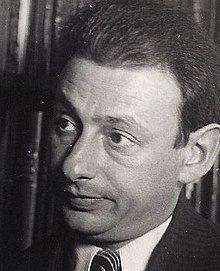
Back غرشوم شوليم Arabic جيرشوم ستشوليم ARZ Gershom Scholem Catalan Gershom Scholem Czech Gershom Scholem Welsh Gershom Scholem Danish Gershom Scholem German Gershom Scholem Esperanto Gershom Scholem Spanish گرشام شوئلم Persian
Gershom Scholem | |
|---|---|
| גרשום שלום | |
 Scholem, 1935 | |
| Born | Gerhard Scholem 5 December 1897 |
| Died | 21 February 1982 (aged 84) |
| Nationality | German Israel |
| Alma mater | Frederick William University |
| Notable work | Sabbatai Zevi, the Mystical Messiah Major Trends in Jewish Mysticism |
| Spouse | Fania Freud Scholem |
| Awards | Israel Prize Bialik Prize |
| Era | 20th-century philosophy |
| Region | German philosophy Jewish philosophy |
| School | Continental philosophy Kabbalah Wissenschaft des Judentums |
| Institutions | Hebrew University of Jerusalem |
Main interests | Philosophy of religion Philosophy of history Mysticism Messianism |
Gershom Scholem (Hebrew: גֵרְשׁׂם שָׁלוֹם) (5 December 1897 – 21 February 1982) was a German-born Israeli philosopher and historian. Widely regarded as the founder of modern academic study of the Kabbalah, Scholem was appointed the first professor of Jewish mysticism at Hebrew University of Jerusalem.[1]
Scholem is acknowledged as the single most significant figure in the recovery, collection, annotation, and registration into rigorous Jewish scholarship of the canonical bibliography of mysticism and scriptural commentary that runs through its primordial phase in the Sefer Yetzirah, its inauguration in the Bahir, its exegesis in the Pardes and the Zohar to its cosmogonic, apocalyptic climax in Isaac Luria's Ein Sof that is known collectively as Kabbalah.[2][3]
- ^ Magid, Shaul (14 May 2024). Edward N. Zalta (ed.). Gershom Scholem. Stanford Encyclopedia of Philosophy (Spring 2009 Edition).
- ^ Scholem, Gershom (1987). Origins of the Kabbalah. R. J. Zwi Werblowsky. [Philadelphia]: Jewish Publication Society. ISBN 0-691-07314-7. OCLC 13456988.
- ^ Scholem, Gershom (1961). Major trends in Jewish mysticism. New York: Schocken Books. ISBN 0-8052-0005-3. OCLC 670936.